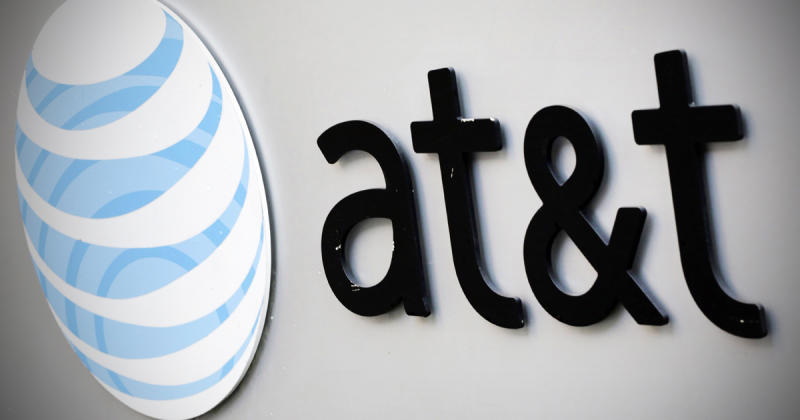
I do believe so...they gobbled up old Ma & Pa Bell as well as Yahoo.com..and are in the process of gobbling up all Ma & Pa internet as well as cell phone providers...is this a bad thing? Indeed it is...they continually raise their rates on a month to month basis after sucking in unknowing customers with rediculous bait and switch plans...suck them in with low rates for the first 6 to 12 months...while not advising customers of the fees, hidden taxes,rental for equipment charges etc.
Once a customer receives their real billing they go into shock and try to cancel ...however there is another hidden charge for cancellation $180. +++ and the remainder of the contract!
Yes anti-trust and monopoly laws were enacted to protect the public from monopolies which can control the market and raise rates on a whim without improving service (Known as gouging)... a win- win for the monopolies a lose-lose for the public..being that competition has been proverbially removed from the competition process!
Antitrust laws, also known as competition laws, are legal
rules to promote fair competition in the marketplace. These laws can
apply to both businesses and individuals. Antitrust laws are designed to
prevent actions that might hurt consumers or unfairly harm other
businesses, such as the formation of monopolies, illegal cooperation
between competing businesses, and certain mergers
between companies. These types of laws are in effect in many countries,
and are even shared between countries in some cases, such as in the European Union.
Competition and Monopolies
In most cases, competition between businesses results in lower prices for consumers. It may also encourage businesses to provide a higher quality of goods and services in order to attract customers. When a business is a monopoly, it is the only seller of a particular product or service in its market; without competition from other businesses, it is often able to charge consumers higher prices. Antitrust laws may help prevent companies from becoming too large, eliminating their competition, or being able to fix prices in the marketplace.SEE: http://constitution.laws.com/the-supreme-court/monopolies
http://www.wisegeek.org/what-are-antitrust-laws.htm#didyouknowout
~~~~~~~~~~~~~~~~~~~~~~~~~~~~~~~~~~~~~~~~~~~~~~~~~~~~~~~~~~~~~~~~~~~~~
AT&T’s stunningly shameless new take on net neutrality
by:
Brad Reed
All big companies spin the truth in ridiculous ways, but every once in a while a company will try to distort reality in such a way that you just have to tip your cap in awe. Such was the case this week when AT&T CEO Randall Stephenson explained why his company plans to move forward with $18 billion worth of broadband investments despite the fact that the Federal Communications Commission earlier this year passed what he and his fellow big carriers depicted as investment-destroying net neutrality regulations.
DON’T MISS: If this report is correct, the iPhone 6s might be the biggest ‘S’ upgrade ever
In an interview with CNBC on Monday, Stephenson said AT&T wasn’t worried about the FCC’s net neutrality rules hurting its ability to make major investments because those rules are likely to get overturned by the courts anyway.
“We have seen the way the rules came out, … and as we read those rules we do believe they are subject to modification by the courts,” he said. “So we’ve said we’re going to invest around $18 billion this year. That will allow us to deploy a wireless broadband solution to 13 million homes around the U.S.”
Of course, if AT&T has always been so confident that either the courts or Congress will throw out the FCC’s net neutrality rules, you have to wonder why it made such a huge stink about them in the first place.
Here, for example, is AT&T senior executive VP Jim Cicconi earlier this year talking about the horrible cloud of uncertainty the FCC’s vote had placed over the entire industry.
“Instead of a clear set of rules moving forward, with a broad set of agreement behind them, we once again face the uncertainty of litigation, and the very real potential of having to start over – again – in the future,” he wrote.
Granted, Cicconi also said it was very likely the the courts or Congress would throw out the FCC’s rules. But, unlike Stephenson, he didn’t see that as a positive because it would have just resulted in even more uncertainty and turmoil. Does that sound like the kind of environment where AT&T would happily invest $18 billion more into making network improvements?
Of course, AT&T isn’t the only carrier that has screamed about investment-killing net neutrality regulations while also spending significant cash to upgrade its networks. Comcast, for instance, revealed that it plans to bring a 2Gbps fiber service to as many as 18 million American homes by the end of the year. This is obviously not the sort of thing you’d expect to see announced if the FCC’s net neutrality rules were really as draconian as many ISPs had claimed and Comcast made this announcement well after the FCC made its final decision on net neutrality.
In fact, these sorts of things make us think that ISPs were seriously exaggerating the supposed threat posed by net neutrality to their bottom lines. Who would have thought?
Related stories
No comments:
Post a Comment